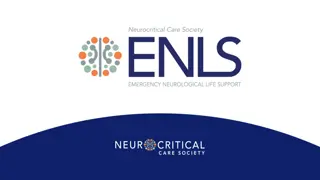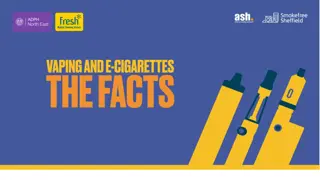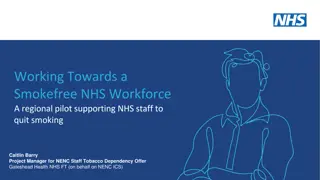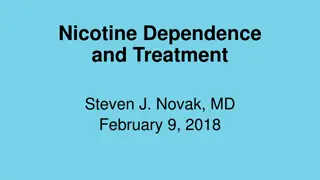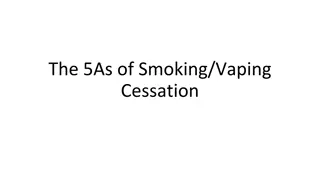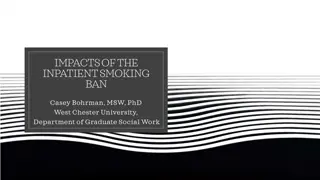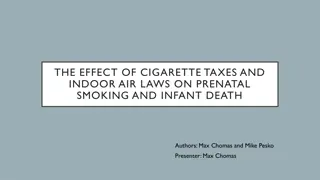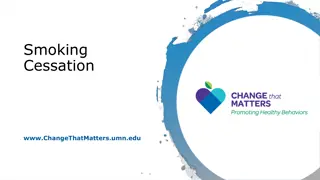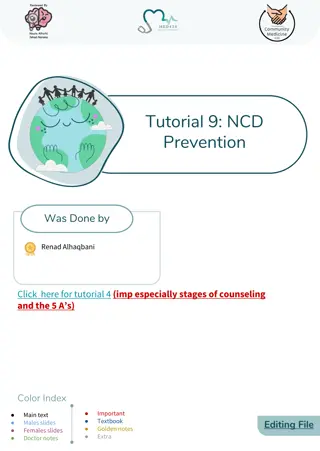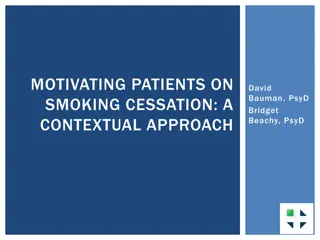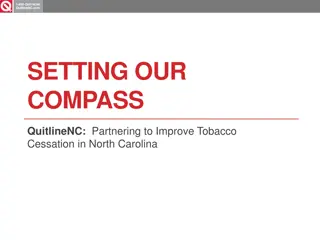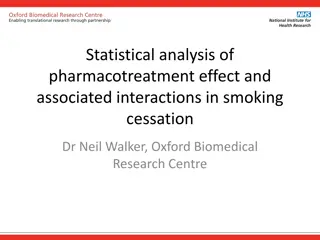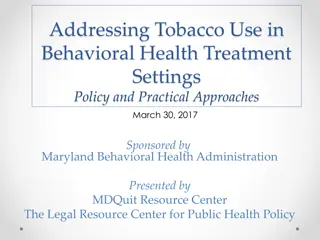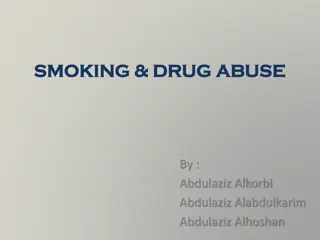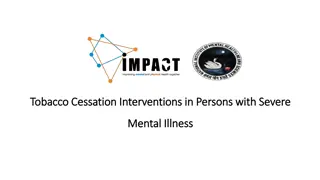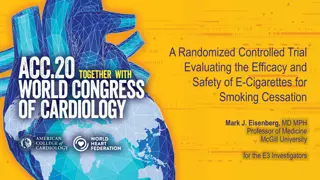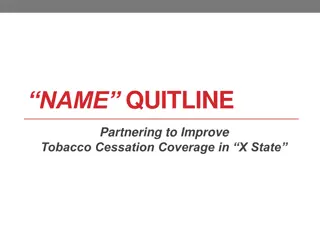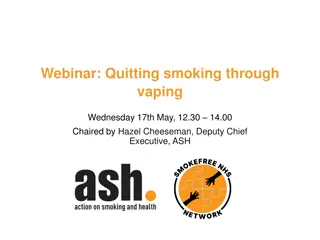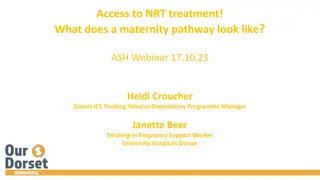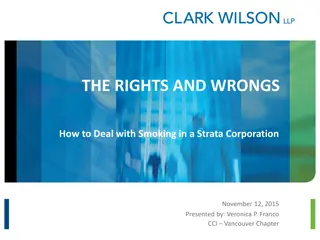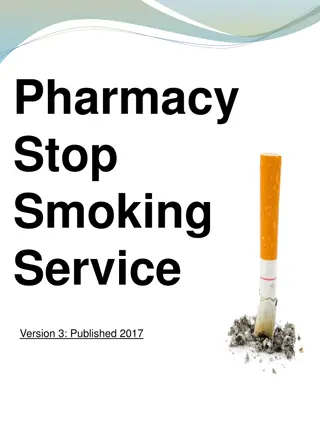Pharmacotherapy Approaches in Smoking Cessation Programs
The Pharmacotherapy approaches in the smoking cessation program include the use of e-cigarettes, NRT, varenicline, and nurse initiation of NRT. The E-voucher scheme is implemented to support patients in the community by providing them with pharmacotherapy under the care of Trust-based Tobacco Addiction Advisors. Different scenarios and processes for issuing e-vouchers for NRT and varenicline are explained, along with the transition of care from Trust to Community Stop Smoking Services. The use of PharmOutcomes software and Patient Group Directions is emphasized to ensure effective medication supply and prescribing.
Download Presentation

Please find below an Image/Link to download the presentation.
The content on the website is provided AS IS for your information and personal use only. It may not be sold, licensed, or shared on other websites without obtaining consent from the author.If you encounter any issues during the download, it is possible that the publisher has removed the file from their server.
You are allowed to download the files provided on this website for personal or commercial use, subject to the condition that they are used lawfully. All files are the property of their respective owners.
The content on the website is provided AS IS for your information and personal use only. It may not be sold, licensed, or shared on other websites without obtaining consent from the author.
E N D
Presentation Transcript
QUIT Pharmacotherapy Approaches Sharon Hughes, Healthy Hospital Programme Lead April 2022
SYB ICS Whole ICS Approach 1.5 Million population 5 CCGs 4 Acute Trusts 3 Mental Health Trusts 1 Children's Trust 5 LAs 5 CSSSs (3 providers) plus 2 for children only 350 Community pharmacies Smoking rates above national average 3 places 196,000 SYB Adults Smoke
Four strands Smoking in pregnancy covered in Maternity Services, but pregnant women who are admitted for non obstetric reasons are included in QUIT
Pharmacotherapy Our system system Our Our system Unable to agree a common Trust protocol or formulary E-cigarettes Mental Health Trust, Commonest requested form of nicotine replacement ( 90%) Still hesitancy amongst pharmacists re MH pts and varenicline Nurse initiation of NRT Over counter drug does not need PGD - Use homely remedy BUT think carefully how documented that pt is on NRT Take Home Medication Two weeks Significant problem with pts going home without TTA Funding: Inpt and two week TTA Trusts Post discharge Community SSSs / LAs with CCGs funding additional costs above a baseline equivalent to pre QUIT 100% commissioned activity levels E-voucher license ICS E-Voucher supply and prescribing costs CCGs unless staff supply or pts who not had a TTA - Trust
Why need an E-voucher Scheme Number of different scenarios where patients in the community, who are being supported by Trust TobTAs, will need to be supplied with pharmacotherapy. Modules developed within PharmOutcomes (software used by Community Pharmacies and NHSE) that enable Trust based Tobacco Addiction Advisors to issue an e- referral to community pharmacies requesting them to supply NRT and / or varenicline. Mental Health Trust patients Repeat e-vouchers as TobTAs providing all of their ongoing support Acute Trust patients Mainly one off vouchers until care picked up by Community Stop Smoking Services eg if no TTA, if drug change at 3 day FU call Staff who being supported to QUIT some Trusts
E-voucher cont. The QUIT E-voucher only be used when the patient is under the care of the Trust based TobTAs. Once the patient s care has been transferred to the Community SSS, the Community SSS will use their existing supply routes / voucher schemes. Some Com SSS / SIP now using the PharmOutcomes module for their schemes. As can only have one drop down list of accredited pharmacies, need to access through a separate portal on your PharmOutcomes menu and commissioned separately. Patient Group Direction Each CCG has an identical PGD for varenicline for the QUIT E-voucher, approved by their own governance process. The PGD eligibility criteria covers all SYB CCG patients. (MOU covers this). Varenicline off the market so currently not being utilised.
Contracting e-voucher Service specification developed in association with LPCs Service for supply of NRT and Varenicline via PhamOutcomes based referral Not provision of behavioural support. Behavioural support is via Trust TobTAs or Com SSSs 5 SYB CCGs commissioning collaboratively to ensure a single QUIT service for all SYB pts Contracting letter & service specification allows Community Pharmacy to supply pharmacotherapy to pts from any of the 5 SYB CCGs who are on QUIT Programme pathways Each CCG will process and pay the invoices for patients registered with GPs in their CCG, and residents who live in their catchment area who are not registered with a GP. PharmOutcomes will automatically invoice the correct CCG based upon the patient s GP, monthly.
Fees and Drug cost reimbursement Pharmacies who have signed up set time received a non-recurrent payment of 100 from the CCG on receipt of the signed declaration of competence and attendance at awareness session of 1 pharmacist and 1 support worker. Drug costs Reimbursement of drug cost to pharmacy in line with NHS Business Authority s Dictionary of medicines and devices. VAT applied at low rate to NRT. First supply NRT 2.50 for single NRT, total of 3.50 if on dual NRT 2.50 for single NRT, total of 3.50 if on dual NRT 25 5 Subsequent supply Varenicline First supply by the pharmacy Subsequent supply PharmOutcomes License about 10k per year for total of 200 pharmacies (separate license needed for NRT and varenicline modules) Plus set up fees about 3k
Advance service Our system system Our Our system NHSE Integrated Pharmacy Advance Service Behavioural support and medication Consideration of capacity and uptake Aligning pathways to offer pt choice, but first consideration QUIT offer Pharmacist delivered only Trusts to sort out referral routes Reporting back through Trusts Need to increase geographical coverage across both schemes to improve accessibility.
Lessons Learnt Our system system Our Our system Time delays between set up and use Communications Locum awareness Robust reporting Relationship building Fees


